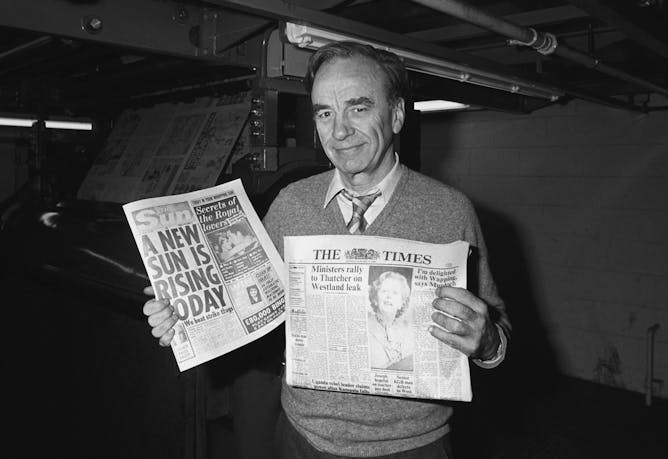|
When Sucession’s Logan Roy said, “Money wins. Here’s to us,” he seemed to be crystalising the mindset of the media mogul. Roy was heavily based on that real-life media tycoon, Rupert Murdoch, who has now retired from the Fox and News Corporation boards at the age of 92, leaving son Lachlan as the sole executive in charge of the global media empire.
Professor of modern history Simon Potter examines Murdoch, and the influence he has had over culture and politics, in our latest Insights long read on press barons through the ages. He concludes that Murdoch ran his media concerns aggressively, willing to accept short-term financial losses to secure long-term market dominance. “This approach is rooted in the golden age of the press barons, when the dominant business strategy was to take over or shut down the competition, allowing the victor to rake in windfall profits unopposed,” he writes.
Press barons aren't well known for creating warm and cosy working environments, but recent cases have thrown the spotlight on the harsh reality of working in the TV industry. That is leading to renewed scrutiny of endemic bullying and harassment and calls for working practices to change.
And three climate experts examine the “medicane” storm that devastated Libya to see if it was a freak occurrence or a glimpse of North Africa’s future.
|

|
Paul Keaveny
Investigations Editor
|
|

Rupert Murdoch in 1986.
PA Images / Alamy Stock Photo
Simon Potter, University of Bristol
Newspaper owners used to wield huge political influence – but as Rupert Murdoch steps down for his son Lachlan can the same be said of today’s?
|

Gnepphoto/Shutterstock
Christa van Raalte, Bournemouth University; Richard Wallis, Bournemouth University
Working practices in the TV industry are in dire need of change to stop workplaces from being environments that facilitate abuse and harassment.
|

EPA-EFE/STR
Mike Rogerson, Northumbria University, Newcastle; Belkasem Alkaryani, University of Tobruk; Mahjoor Lone, Northumbria University, Newcastle
Climate models suggest North Africa will get drier in future. But its caves tell a different story.
|
Politics + Society
|
-
Craig Prescott, Royal Holloway University of London
A trip abroad marks the return of the British monarchy’s international angle after Charles mother stopped travelling.
-
Basil Germond, Lancaster University
Ukraine’s recent successes at sea and in Crimea create strategic opportunities in the Black Sea and, in the longer term, for the war on land.
-
Rebecca Selberg, Lund University
Doctors, teachers and dentists are to be forced to report undocumented migrants to the authorities but they are refusing to comply.
|
|
Arts + Culture
|
-
Deborah Shaw, University of Portsmouth
There’s less sex but more exploration as the Moordale crew embark on new adventures in the show’s last season.
-
Natalie Wall, University of Liverpool
Online reading communities have been around for a while but none of them have captured the attention of readers, publishers and retailers quite like BookTok.
-
Nicholas Daly, University College Dublin
The stylish Oscar Wilde animation has a distinguished cast, including Stephen Fry and Hugh Laurie.
|
|
Business + Economy
|
-
Larisa Yarovaya, University of Southampton
Dumb Money depicts the real-life GameStop short squeeze that fuelled the ‘meme stock’ trend.
|
|
Environment
|
-
Tom Stacey, Anglia Ruskin University
Research on how people adopt new technologies suggests the transition is now well under way.
-
Ludovica Gazze, University of Warwick
The government’s unpredictable approach to energy-efficiency has cost progress to net zero before.
-
Andrea Brock, University of Sussex
Clashes at a huge coal mine were the latest episode in a long struggle.
|
|
Health
|
-
Alisha Palmer, The University of Edinburgh
Abortion has a long and varied history and remains central to our culture, our lives and even our art.
-
Rachel Moseley, Bournemouth University
Autistic girls tend to be diagnosed significantly later than boys,
|
|
Science + Technology
|
-
Monica Grady, The Open University
Missions to asteroids are opening up the secrets of the Solar System
|
|
|
|
| |
|
|
|
|
| |
| |
| |
| |
| |
|
|